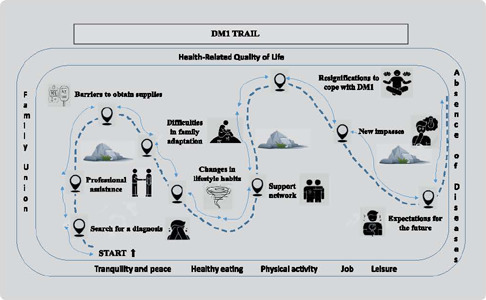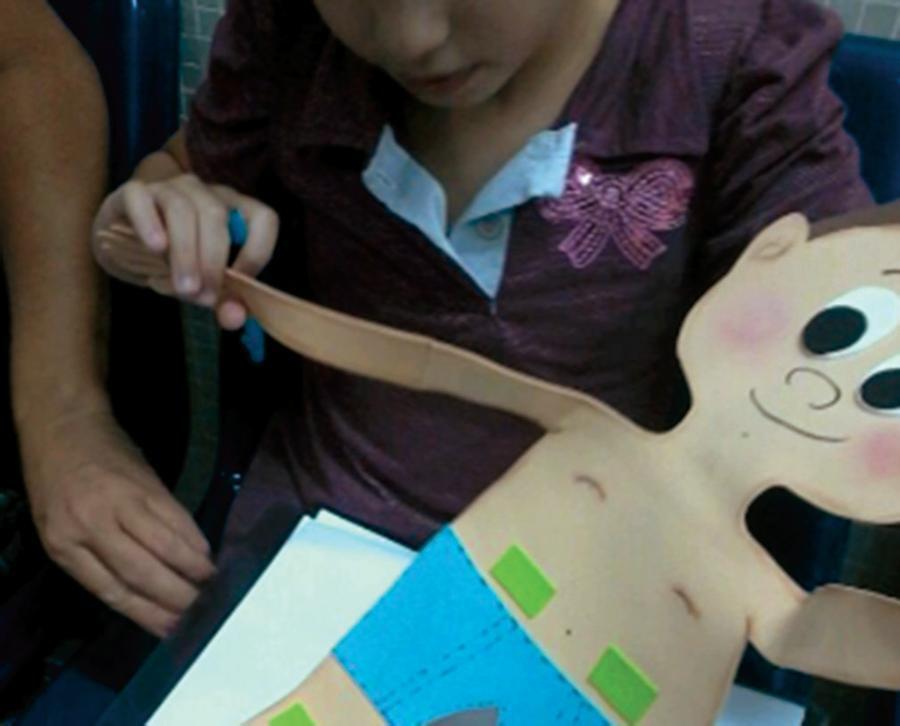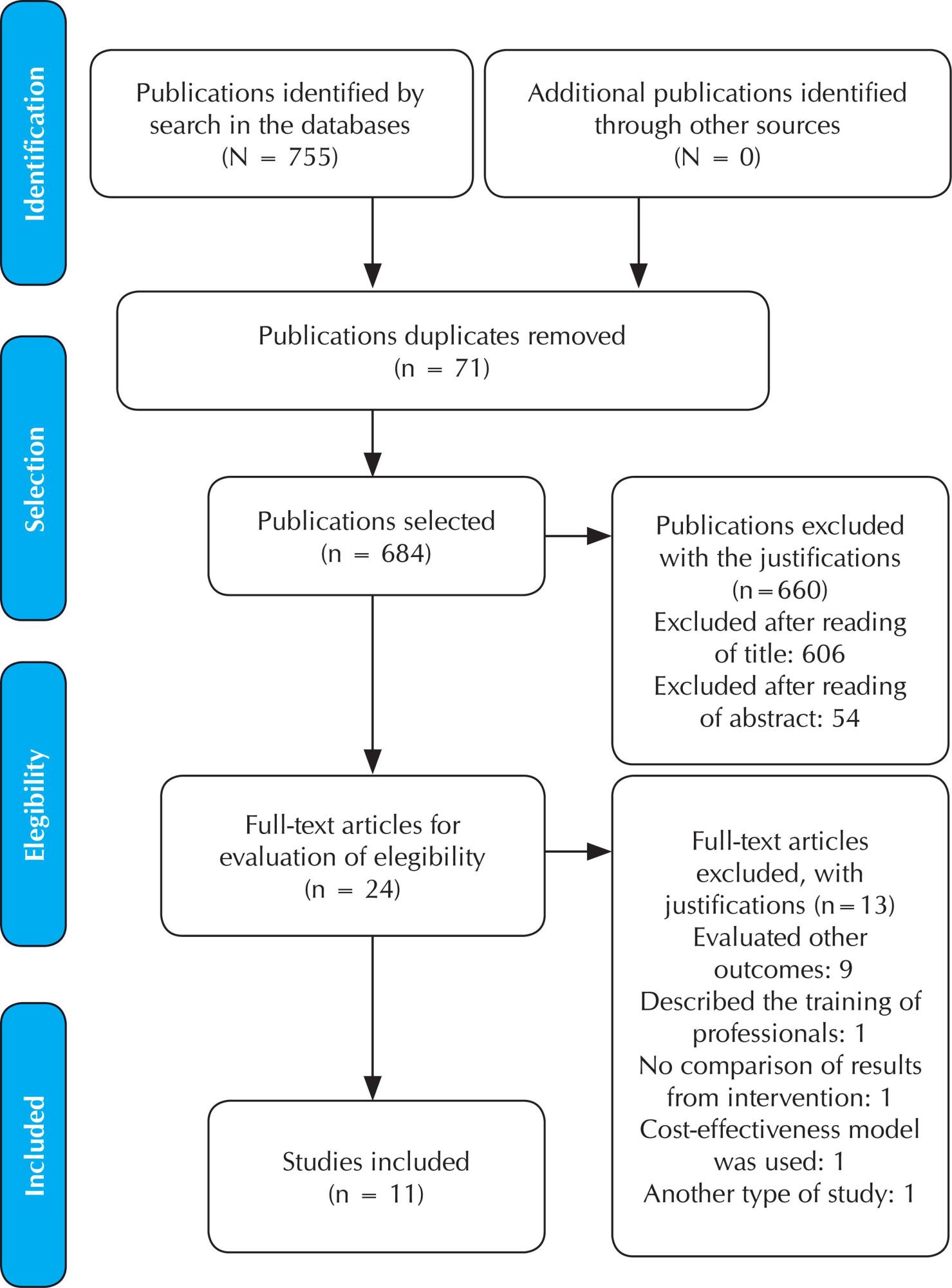-
ORIGINAL ARTICLE06-14-2024
Meanings attributed to health-related quality of life by caregivers of adolescents with diabetes
Revista Brasileira de Enfermagem. 2024;77(2):e20230314
Abstract
ORIGINAL ARTICLEMeanings attributed to health-related quality of life by caregivers of adolescents with diabetes
Revista Brasileira de Enfermagem. 2024;77(2):e20230314
DOI 10.1590/0034-7167-2023-0314
Views0See moreABSTRACT
Objective:
to interpret the meanings attributed to the health-related quality of life by caregivers of adolescents with type 1 diabetes mellitus.
Methods:
qualitative, descriptive-exploratory study of 14 caregivers of adolescents with diabetes developed at the reference outpatient clinic for endocrine diseases in a city in the state of Paraíba. Interviews were performed between May and September 2021. Inductive thematic analysis of the empirical material, and its interpretation in light of the concepts of health-related quality of life and family functioning were performed.
Results:
the meanings attributed by caregivers to the health-related quality of life of adolescents converged on the feeling of being healthy, healthy eating, satisfactory family income, family involvement in care and effective access to the care network.
Final Considerations:
knowledge of these meanings enables health professionals to develop strategies that meet the unique demands of caregivers experiencing this diagnosis.

-
ORIGINAL ARTICLE07-31-2020
Explanatory models of families of children with type 1 diabetes mellitus
Revista Brasileira de Enfermagem. 2020;73:e20180975
Abstract
ORIGINAL ARTICLEExplanatory models of families of children with type 1 diabetes mellitus
Revista Brasileira de Enfermagem. 2020;73:e20180975
DOI 10.1590/0034-7167-2018-0975
Views0See moreABSTRACT
Objectives:
to analyze how children with type 1 diabetes mellitus and their families explain the pathology, based on their understanding of the factors related to the discovery of diabetes, the etiology, treatment, and prognosis of the disease.
Methods:
qualitative methodological approach, based on medical anthropology and the narrative method. In-depth interviews were conducted with 12 families of children with type 1 diabetes mellitus attending follow-up consultations at a specialized center. The statements were subjected to inductive thematic analysis.
Results:
the explanatory models identified describe the families search for the clarification of the signs and symptoms that the child had. Faced with the disease, families reorganized themselves to meet new health care needs of children, such as adequate nutrition, physical exercise, and blood glucose monitoring.
Final Considerations:
knowing the explanatory models allows the understanding of how families give meaning to the child’s illness, favoring daily nursing care and an effective control of the disease.
-
Instructional therapeutic toy in the culture care of the child with diabetes type 1
Revista Brasileira de Enfermagem. 2018;71:1334-1342
Abstract
Instructional therapeutic toy in the culture care of the child with diabetes type 1
Revista Brasileira de Enfermagem. 2018;71:1334-1342
DOI 10.1590/0034-7167-2017-0260
Views0See moreABSTRACT
Objective:
To analyze the experience of the child with diabetes type 1 in the care related to the techniques of glycemic monitoring and insulin application by use of instructional therapeutic toy, in accordance with the culture care.
Method:
Qualitative study with premise of the ethnonursing carried out in secondary public service of reference in the treatment of diabetes, in the city Fortaleza, Ceará State, between January and November of 2014, among 26 school-age children. Based on the Observation, Participation, Reflection Enabler, were developed educational activities using instructional therapeutic toy.
Results:
The children expressed doubts regarding the insulin therapy and the glycaemia checking. They also were interested in the orientations mediated by means of the therapeutic toy in the culture care. They asked about the rotation, location and administration of the insulin. Some children asked for the syringes to play and learn how to inject it in the dolls.
Conclusion:
To bring in this activity promoted approximation and effective communication with the child in the educational approach, increasing its ability in the self care.

-
Impact of educational interventions in reducing diabetic complications: a systematic review
Revista Brasileira de Enfermagem. 2016;69(4):773-784
Abstract
Impact of educational interventions in reducing diabetic complications: a systematic review
Revista Brasileira de Enfermagem. 2016;69(4):773-784
DOI 10.1590/0034-7167.2016690422i
Views0ABSTRACT
Objective:
To identify in the literature evidence of the effectiveness and efficacy of educational interventions in reducing metabolic and/or vascular complications in adults with diabetes mellitus.
Method:
A systematic review performed in LILACS, IBECS, CUMED, CINAHL and Medline databases and in the online library SciELO with studies published from 2004 to 2014.
Results:
Eleven studies were included (5 randomized clinical trials and 6 quasi-experimental). We only identified studies that analyzed vascular complications.
Conclusion:
Two clinical trials demonstrated efficacy in reducing cardiovascular complications, of cataract or retinopathy and nephropathy and all the quasi-experimental studies showed effectiveness in reducing feet ulcers, peripheral neuropathy and vasculopathy, and maintenance of kidney function.
Keywords:Diabetes Mellitus Type 1Diabetes Mellitus Type 2Diabetic ComplicationsEvaluation of the Efficacy-Effectiveness- of InterventionsHealth EducationSee more



